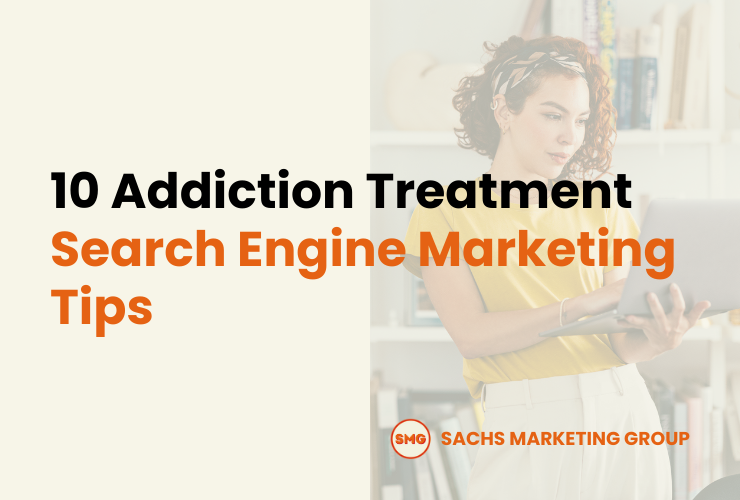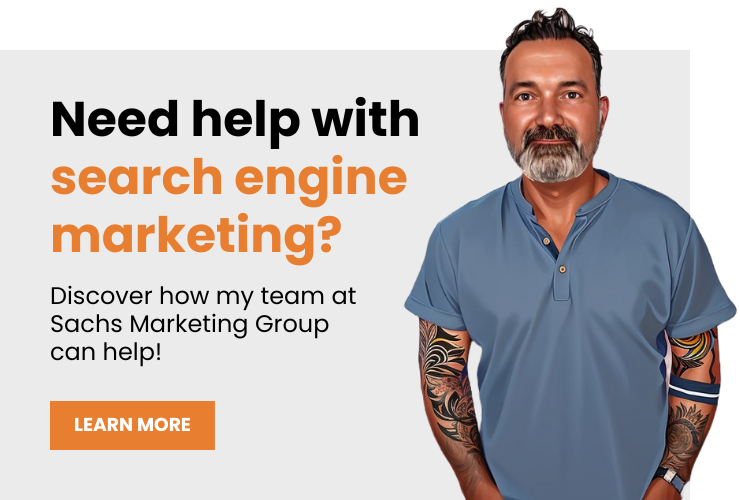There are several addiction treatment search engine marketing tips that will help your treatment center reach more people who are actively seeking help, optimize your online presence, and ultimately improve your facility's admission rates.
The addiction treatment industry is highly competitive and sensitive, requiring a unique approach to online marketing.
Your treatment center faces the pressing problem of reaching people in need while adhering to ethical advertising standards. Fortunately, we have some addiction treatment search engine marketing tips to help you get started.
In this article, you will discover several addiction treatment search engine marketing tips that will help you strengthen digital marketing for rehab and addiction centers and help drive phone calls.
Key takeaways
- Conduct thorough keyword research and utilize geo-targeting to ensure ads reach the right audience, focusing on specific, relevant search terms and geographic locations.
- Continuously A/B test ad elements like headlines and CTAs, and make necessary adjustments based on performance data to improve conversion rates.
- Engage specialized search engine marketing agencies to navigate industry-specific challenges, ensuring compliance, effective ad management, and maximized ROI.
Overview
What is Addiction Treatment Search Engine Marketing?
Addiction treatment search engine marketing (SEM) is a specialized form of online advertising that aims to increase the visibility of addiction treatment centers in search engine results. Through techniques such as pay-per-click (PPC) advertising, keyword optimization, and landing page improvements, SEM targets potential clients who are actively looking for addiction treatment options.
Addiction Treatment Search Engine Marketing Tips
Treatment centers often struggle with reaching their target audience while also navigating the complexities of healthcare advertising regulations. However, implementing specific search engine marketing tips can alleviate these challenges and improve your facility's reach.
Here are 10 addiction treatment search engine marketing tips to help you get started:
1. Do Your Keyword Research
Keyword research is the bedrock upon which a successful addiction treatment search engine marketing campaign is built. Its importance cannot be overstated because it involves identifying the exact phrases, terms, and questions your target audience is typing into search engines when seeking addiction treatment options. Utilizing tools like Google's Keyword Planner, SEMrush, or Ahrefs can offer essential data such as search volumes, competition levels, and the cost-per-click for different keywords.
It's not just about identifying high-volume keywords; you must also consider searcher intent and the stage of the buyer’s journey the searcher is in. For instance, someone using the keyword "what is opioid addiction?" is likely at the awareness stage, while someone searching for "best opioid recovery center near me" is closer to making a decision.
For example, if you specialize in alcohol addiction treatment, you may find that targeting long-tail keywords like "alcohol addiction treatment programs in [City]" can yield better results than more generic terms. These keywords may have less competition, allowing you to rank higher in search results, and are also more likely to attract potential clients specifically interested in the services you offer.
2. Use Geo-Targeting
Geo-targeting is not merely an optional feature in search engine marketing; it's often a critical strategy for addiction treatment centers. By narrowing down the geographic scope of your ads, you ensure that they're only displayed to users in particular cities, states, or regions. This is vital for optimizing your advertising spend and making sure that your message reaches those who are most likely to enroll in your treatment programs.
Being too broad in your geographic targeting could waste your ad spend on clicks that have zero chance of converting because the user finds your location inconvenient. On the other hand, too narrow a focus could mean missed opportunities. The key is to strike a balance based on data and testing.
For example, suppose you have an addiction treatment center in Chicago. Through geo-targeting, you can configure your search engine marketing campaign to display ads only to people located within a 30-mile radius of Chicago. You could even use geo-targeting features to exclude areas where you know your services may not be as relevant or competitive.
By making intelligent use of keyword research and geo-targeting, you're not just blindly executing a search engine marketing campaign; you're implementing a well-thought-out strategy aimed at maximizing both visibility and conversions.
3. Make Sure Your Ads Are Compliant
Compliance is a critical aspect of addiction treatment search engine marketing. Due to the sensitive nature of the healthcare industry, there are specific guidelines and regulations you must adhere to, especially when it comes to advertising. Failure to comply can not only result in penalties and loss of ad privileges but also damage your brand's reputation.
For example, the Health Insurance Portability and Accountability Act (HIPAA) imposes strict requirements on how patient data is handled. Any content that may allude to individual cases must be carefully managed to avoid violating privacy laws.
Platforms like Google have particular policies in place and require LegitScript certification in order to run Google Ads. These guidelines often stipulate what you can and can't say on your website and in your ads, requiring factual, non-exaggerated claims.
For example, let's say you want to advertise a new treatment program for alcohol addiction. Your ads must not make claims like "100% success rate" unless you have verifiable evidence to support this. Instead, opt for language that focuses on the comprehensive nature of your treatment programs, like “holistic approach to alcohol addiction treatment.”
4. Produce Quality Content
Producing quality content is another indispensable aspect of effective search engine marketing for addiction treatment centers. The content you generate—be it blog posts, eBooks, or videos—should be informational, engaging, and above all, valuable to your audience.
In the addiction treatment industry, you're dealing with people's lives. Therefore, the information you provide must be factual, helpful, and empathetic. Fluff and generic content won't suffice; it has to resonate with your audience's specific problems and questions.
Quality content can also help establish your addiction treatment center as an authority in the field, creating trust that is invaluable in attracting and retaining clients.
For example, you might consider producing a series of blog posts centered around the science of addiction, treatment methods, and recovery tips. By basing these posts on research, citing reliable sources, and presenting the information in a patient-friendly manner, you could establish your center as a go-to resource for quality information on addiction treatment. Not only does this enhance your reputation, but it also aids your SEO efforts, drawing in more organic traffic through valuable keywords.
5. Create Optimized Landing Pages
When it comes to search engine marketing, your landing pages can make or break your campaigns. Optimized landing pages can significantly increase your conversion rates, ensuring that the clicks you get translate into actionable leads.
User experience (UX) design is critical for maintaining visitor engagement. An optimized landing page should be intuitive, with clearly marked calls-to-action (CTAs), and easy navigation. The quicker a visitor can figure out what to do next, the higher the chance they'll convert.
Your landing pages must be relevant to the ad or link that the visitor clicked on. If your ad talks about a particular treatment program, the landing page it leads to should provide comprehensive details about that very program, and not some other treatment options.
For instance, if you're running a PPC ad campaign promoting a new opioid addiction treatment, the landing page should provide in-depth information about the opioid addiction treatment, success stories, and a simple way to get in touch—such as a contact form or a "Call Now" button.
6. Leverage the Power of Retargeting
Retargeting is a powerful tactic that can dramatically improve your addiction treatment center’s marketing ROI. It involves tracking visitors to your website who didn't convert—meaning they didn't fill out a contact form, make a call, or take some other desired action—and then showing them targeted ads as they visit other websites or social media platforms.
People visiting your site without converting are often still in the research phase. Retargeting allows you to stay top-of-mind as they move closer to making a decision, increasing the likelihood that they'll choose your treatment center when they're ready.
You can leverage different kinds of retargeting, such as pixel-based retargeting, which serves visitors ads almost immediately after leaving your site, or list-based retargeting, which involves creating personalized email campaigns based on user behavior.
Let’s say, for example, a visitor reads a blog post about alcohol addiction treatment but leaves without contacting your center. Through retargeting, you can later show them display ads for your alcohol addiction treatment programs when they are browsing other websites or social platforms. These ads can contain persuasive messages and CTAs like "Take the first step towards recovery. Learn more now."
7. Highlight Social Proof
Social proof is a psychological phenomenon where people are more likely to take an action if they see others have successfully done so before. In the context of addiction treatment search engine marketing, showcasing social proof can make your facility more trustworthy and relatable.
Types of Social Proof:
- Testimonials: Written or video testimonials from past patients or their families can be powerful. These offer first-hand accounts of the effectiveness of your treatment programs.
- Reviews and Ratings: Show off your high ratings from trusted review platforms or even include snippets of positive reviews.
- Case Studies: Detailed case studies can highlight individual stories of recovery, painting a vivid picture of the transformative work your center performs.
Suppose you have an addiction treatment program that has helped hundreds. On the landing page where this program is detailed, you could feature a sidebar with short video testimonials and quotes saying, "This program saved my life," or "My son is sober today thanks to [Your Treatment Center]."
8. Use Compelling Calls to Action
A Call to Action (CTA) is a prompt that tells the user precisely what action to take next. In addiction treatment search engine marketing, CTAs are crucial for converting interested visitors into leads or customers.
Characteristics of a Good CTA:
- Clarity: The CTA should make it clear what will happen when clicked. Instead of vague phrases like "Learn More," use more specific terms like "Download Our Free Guide to Recovery."
- Urgency: Creating a sense of urgency can encourage users to take action now rather than later. Phrases like "Call Now for a Free Consultation" or "Limited Slots Available" can instill urgency.
- Visibility: Your CTAs should stand out on the page. Using contrasting colors, larger fonts, or even subtle animations can draw the user’s eye to the action you want them to take.
For example, if one of your treatment programs has a high success rate, you could use a CTA like "Join the 90% of Individuals Who Found Recovery—Apply Now." This not only creates urgency but also ties back to the social proof, reinforcing the idea that this program is effective.
9. A/B Test, Review Results, and Adapt
A/B testing involves creating two versions of a webpage, email, or ad campaign to determine which one performs better in terms of conversions, clicks, or any other metric you're tracking. For instance, you could A/B test two different headlines on your landing page to see which one resonates more with your audience. Once you run enough traffic through both versions, you'll collect data that shows which version achieved better results.
However, A/B testing is not a one-time task. It’s a continuous process of improvement. After you identify a winner, make that your new default and start a new test against another variable. You might then test the color of your call-to-action button, the placement of testimonials, or the images you use. By continually refining your campaigns in this way, you'll steadily improve performance, ensuring you're always optimizing for the highest possible return on investment.
10. Hire a Search Engine Marketing Agency
Managing search engine marketing for an addiction treatment center can be complex and time-consuming. If not done correctly, you may also run the risk of wasting money on ineffective campaigns or even harming your online reputation. Hiring a specialized search engine marketing agency can alleviate these problems by bringing their expertise to the table.
Agencies have the know-how to conduct keyword research, develop targeted ads, manage your budgets, and continually optimize your campaigns. They also stay updated on industry regulations and compliance, ensuring your ads meet all legal requirements.
Moreover, an agency can provide valuable insights into your marketing performance. Through detailed analytics and reporting, they can show you exactly how your campaigns are performing and where there's room for improvement. In a field as sensitive and competitive as addiction treatment, the added efficiency and effectiveness that come from hiring a specialized agency can make all the difference.
Partner with Sachs Marketing Group
Are you overwhelmed by the intricacies of search engine marketing for your addiction treatment center?
Sachs Marketing Group specializes in creating effective addiction treatment search engine marketing strategies and rehab PPC advertising for addiction treatment facilities, ensuring you reach the right people at the right time.
Imagine your facility fully booked, with a waiting list, all because your marketing efforts are finally hitting the mark.
Don’t struggle alone with your search engine marketing. Partner with Sachs Marketing Group today to accelerate your facility's growth and provide help to those who need it the most.
Get a free, no obligation review of your digital marketing strategy!
"*" indicates required fields




